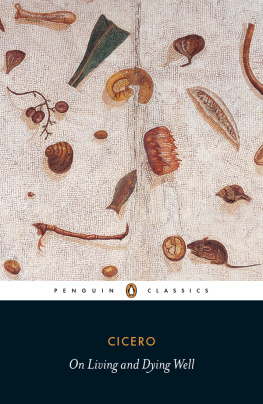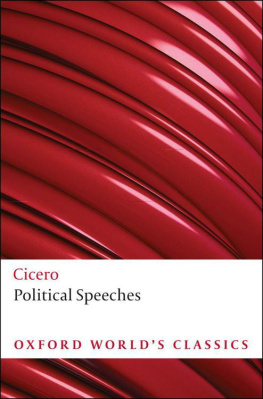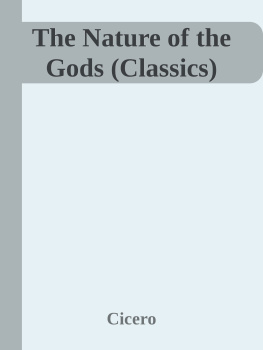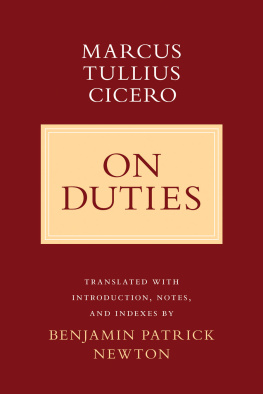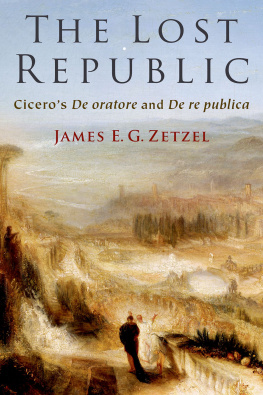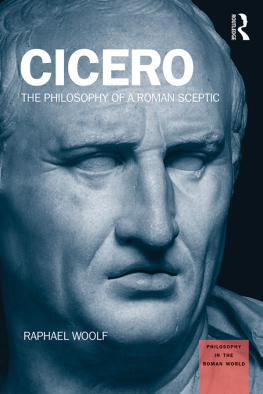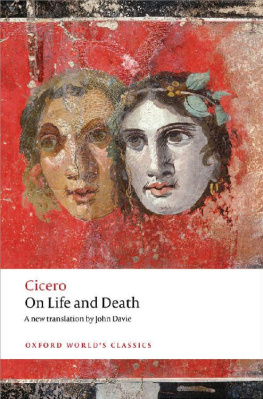
CICERO
SELECTED WORKS
ADVISORY EDITOR: BETTY RADICE
MARCUS TULLIUS CICERO (10643 BC), Roman orator and statesman, was born at Arpinium of a wealthy local family. He was taken to Rome for his education with the idea of a public career and by 70 BC he had established himself as the leading barrister in Rome. In the meantime his political career was well under way and he was elected praetor for the year 66. His ambitious nature enabled him to obtain those honours which would normally only have been conferred upon members of the Roman aristocracy, and he was duly elected consul for 63. An ineffective though not dishonourable statesman, Cicero was the greatest of the Roman orators, possessing a wide range of technique and an exceptional command of the Latin tongue. He followed the common practice of publishing his speeches.
His remarkably informative letters, published posthumously reflect the changing personal feelings of an emotional and sensitive man. His deeper thoughts are revealed by a considerable number of writings on moral and political philosophy, on religion and on the theory and practice of rhetoric. In addition to the great influence these have exercised on subsequent European thought, they are of profound intrinsic interest, as the selected works in the present volume reveal.
MICHAEL GRANT has been successively Chancellors Medallist and Fellow of Trinity College, Cambridge, Professor of Humanity at Edinburgh University, first Vice-chancellor of Khartoum University, President and Vice-chancellor of the Queens University of Belfast, and President of the Classical Association. Writings: translations of Ciceros On Government, On the Good Life, Selected Works, Selected Political Speeches and Murder Trials, Suetonius The Twelve Caesars and Tacitus Annals, and the revised Robert Gravess edition of The Golden Ass by Apuleius, all for Penguin Classics; Roman Literature (Penguin); The Climax of Rome; The Ancient Historians; Gladiators; Latin Literature and Greek Literature; Cleopatra; The Jews of the Roman World; Roman Myths; The Army of the Caesars; The Twelve Ceasars; The Fall of the Roman Empire; Cities of Vesuvius; Saint Paul; Jesus; History of Rome; The Etruscans; Greek and Latin Authors 800 BCAD 1,000; The Dawn of the Middle Ages; From Alexander to Cleopatra; The Roman Emperors; Greece and Rome: Guide to the Ancient World; The Rise of the Greeks; The Classical Greeks; The Visible Past; Greeks and Romans: A Social History; Readings in the Classical Historians; Julius Caesar, Nero; The Antonines; Art in the Roman Empire; and The Severans.
CICERO
SELECTED WORKS
AGAINST VERRES-1
TWENTY-THREE LETTERS
THE SECOND PHILIPPIC AGAINST
ANTONY
ON DUTIESIII
ON OLD AGE
Translated with an Introduction by
MICHAEL GRANT
PENGUIN BOOKS
INTRODUCTION
I
CICERO AGAINST TYRANNY
AMID the recurrent crises of the twentieth century there is a curious topicality in the spectacle of this highly intelligent but far from superhuman personality, first struggling to eminence in a great state, and then having to face, as well as he could, a crushing series of almost world-wide emergencies and convulsions. Very few other men have both stood at the centre of world events and written so well and fully about the part they played. The character that emerges is a complicated one, composed of brilliant but discordant and sometimes contradictory qualities.
His story which will be told - largely by himself - in this book essentially consists of his repeated efforts, in spite of frequent and formidable discouragements, to oppose the autocratic modes of rule which were gradually throughout his life encroaching on the Republican system: and which reached their climax in the wholly authoritarian dictatorships of Sulla (8279 B.C.) and Caesar (4944 B.C.), and the scarcely less formidable committee regimes, both cynical and the second efficiently ruthless, of the two sets of Triumvirs (6050 and 4331 B.C.).
Cicero was not often a very successful politician, but he derives unmistakable greatness from his insistence, against odds, that such dictatorial rulers were in the wrong because they unjustifiably curtailed the freedom of the individual: whereas the ultimate authority should be not themselves but certain unchangeable moral principles which they are incompetent to annul or amend. His own words on the subject, in his treatise On the State (III. 33), written during a period of profound political disappointment, represent an early and fundamental statement of one sides position in a perennial controversy.
True law is Reason, right and natural, commanding people to fulfil their obligations and prohibiting and deterring them from doing wrong. Its validity is universal; it is immutable and eternal. Its commands and prohibitions apply effectively to good men, and those uninfluenced by them are bad. Any attempt to supersede this law, to repeal any part of it, is sinful; to cancel it entirely is impossible. Neither the Senate nor the Assembly can exempt us from its demands; we need no interpreter or expounder of it but ourselves. There will not be one law at Rome, one at Athens, or one now and one later, but all nations will be subject all the time to this one changeless and everlasting law.
That is to say, right and wrong are irreconcilable, and no legislation can make one into the other. But Cicero was not content to enunciate moral principles from the study. For he was one of those politicians, never too numerous and in his day outstandingly rare, who have proposed, in their finest and most unhampered moments, to put their moral principles into practice in the conduct of political affairs.), cannot have been wholly absent from his mind. But this was to be a constitutional, philosophical sort of guidance from the sidelines: dictatorship was and remained the negation of all that he stood for. Indeed, he attempted, at decisive moments of his career, to prevent such regimes from taking root and suppressing the free operation of Republican institutions which alone, in his opinion, could supply the ideal of a stable and balanced state where human beings might express themselves as social creatures.
However, a description limited to those terms does not show the peculiar nature of Ciceros political achievement. The austerely grand picture of a high-minded man resisting tyranny was what he would have liked the world to accept, but the truth is more complex and more interesting. Any consistently straightforward, high-minded approach was, for Cicero, ruled out by insuperable obstacles. The ruthless, cutthroat politics of the late Republic did not allow success to come at all easily to men like him who were excluded by birth and resources from the cliques of great and rich families which, in shifting combinations, traditionally dominated the Senate and the state.
Cicero was only able to fight against these difficulties at all because of his incomparable eloquence, which was as welcome a support to political leaders as the backing of a leading daily newspaper would be today. But Ciceros struggle to utilize this asset to the best effect was seriously impeded by his own personality; for his extraordinary talent was matched by equally conspicuous faults and weaknesses, including snobbery, vanity, extravagance, vacillation and a too emotional and rancorous judgement of political problems not to mention a tendency to make enemies by injudicious jokes. In the recurring dilemmas of a hideously disturbed national situation he was obliged to accept many humiliating failures and compromises. Matched as in single duel, as de Quincey described him, with a strong temptation to error growing out of his public position, Cicero repeatedly changed direction, laid himself open to many charges of insincerity, and not infrequently despaired. His practice abundantly fell short of his principles and pronouncements.


